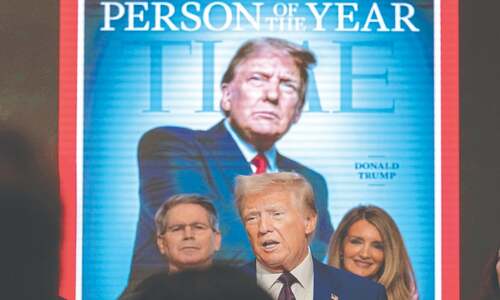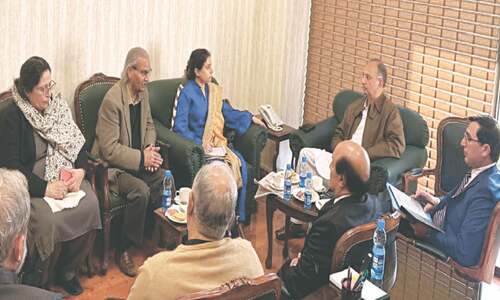RABAT: A new United Nations envoy to Western Sahara appears to have only limited chances of success as he seeks to inject new life into negotiations to end Africa’s longest-running territorial dispute.
As a US career diplomat specialising in the Middle East, Christopher Ross is used to dealing with intractable disputes and seemingly insurmountable rivalries.
Analysts are wondering what new ideas he can use to prise open a deadlock that has soured relations between Morocco and neighbour Algeria and held back the region’s development.
Morocco annexed Western Sahara, a desert territory larger than Britain, in 1975 and Algeria supported Sahrawi independence movement Polisario when it took up arms against Moroccan forces.
The UN brokered a ceasefire in 1991 but neither party could agree the rules of a referendum on Western Sahara’s future. A succession of peace envoys and a Moroccan offer of limited autonomy for the territory have failed to end the limbo.
“I don’t think Morocco has any intention of giving anything except autonomy under Moroccan sovereignty, something the Sahrawis are completely unlikely to accept,” said David Hartwell, Middle East Editor for Jane’s Country Risk.
Ross’s predecessor, Dutch diplomat Peter Van Walsum, led four rounds of slow-moving peace talks in Manhasset, New York, before he quit the job last August.
Analysts said Ross, 66, would revive the peace talks but both sides were still unwilling to concede enough ground to allow meaningful negotiations.
Best chance
They said his best chance could be to persuade Polisario to propose its own version of autonomy for Western Sahara that gives Morocco at least some role in overseeing the desert territory of 260,000 people.“Self-determination and autonomy are not total opposites,” said Khadija Mohsen-Finan of Paris-based research institute IFRI. “Polisario need enough margin to negotiate an autonomy acceptable to them.”
Walsum angered Polisario last April by saying in an assessment to the UN Security Council that an independent Western Sahara was not a realistic proposition because there was no pressure on Morocco to abandon its sovereignty claim.
He later explained his remarks were a “gamble” to try to break the negotiating logjam.
But analysts agree there is little hope of resolution unless the United States and former colonial power France force Morocco and Algeria to find common ground.
Under the Bush administration, the US was loath to risk antagonising Morocco, a strong ally in its “war on terrorism” that has jailed hundreds of home-grown Islamic radicals in recent years.
Western Sahara is unlikely to be a top priority for incoming US President Barack Obama, who will want to maintain warm ties with Morocco, said Western Sahara expert Jacob Mundy.
“For me, the real question is whether or not the Obama administration will backtrack on the Bush administration’s endorsement of autonomy as the only realistic solution to the conflict,” said Mundy.
“Such declarations of support for Morocco’s position on Western Sahara have helped sour US-Algeria relations and inadvertently supported the more militant voices in Polisario calling for a return to armed struggle.”
He said Ross’s advantage over Walsum was that he has the ear of top officials in the US State Department, who will be more willing to apply pressure when he needs it.
Endorsement
Polisario, Morocco and Algeria quickly welcomed last week’s appointment of Ross, a former US ambassador to Algeria and Syria who was mostly recently a special adviser for the Middle East and North Africa at the US mission to the United Nations.
Moroccan commentators had previously expressed reservations about Ross, suggesting his experience in Algeria would make him biased towards Polisario. But Algerian observers also played down his chances of achieving a breakthrough.
Ross “will open a new page in prolonging the crisis,” said Algerian politics professor Ismail Maaref Ghalia. “America does not want to solve the problem. It prefers a situation of no war and no peace.”
Morocco says an independent Western Sahara would encourage lawlessness and smuggling in a vast desert region known as a hide-out for Islamic extremists.
Polisario, its origins in the left-wing liberation movements of the Cold War, has never espoused radical Islam and insists it will never use terrorism to achieve its aims.
Tens of thousands of Sahrawis displaced by the conflict have lived since the mid-1970s in camps on a windy plateau deep in the Algerian desert and rely on aid, much of it from Algeria.
The Polisario leadership has said it could take up arms again, but most observers say it is too weak militarily and its main backer Algeria would not allow a return to war.
“The situation would have to deteriorate drastically before policymakers in Washington or Paris would pressure Morocco to make real compromises for peace,” said Mundy.—Reuters










































Dear visitor, the comments section is undergoing an overhaul and will return soon.